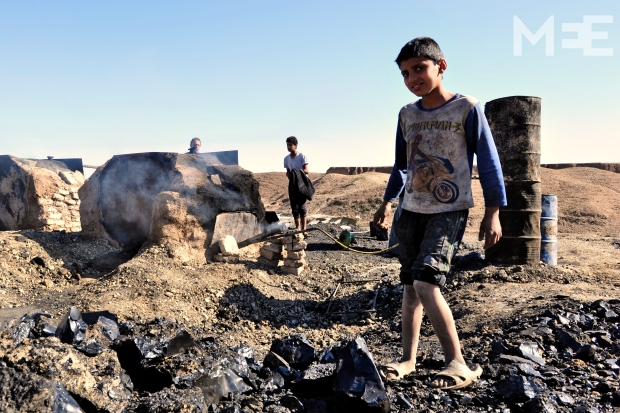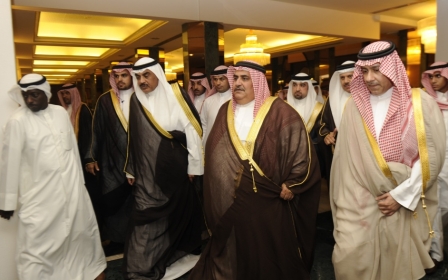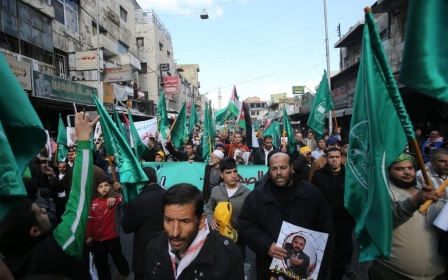Life inside Syria's makeshift oil refineries

In a pit outside Tall Alu, a small Syrian town in al-Hasaka province, about 30 kilometres from the Iraqi border, two men haul a fuel hose towards a battered lorry. Black smoke rises from dozens of oil refining kilns and eye-stinging oil fumes hang in the air, while the workers fill the lorry’s tank with freshly refined fuel.
“We only earn $15 a day but get cancer for free,” said Ahmad al-Khalaf, wiping the sweat off his oil stained face. Wearing a blue shirt blackened with smoke and dust, he looks no different from most of the workers in the area.
Ahmad, a 26-year-old graduate from al-Furat University in Deir ez-Zor, has been working for a year and a half at one of the many makeshift oil refineries around Tall Alu.
“I studied Arabic literature, I'm the first member of my family who went to university,” Ahmad said proudly. He returned to his hometown Tall Alu after he graduated in the summer of 2012, just around the time when the Syrian army withdrew from the Kurdish areas in north-eastern Syria.
“I knew I wouldn't find any appropriate work for my level of education here, but what else could I have done? I needed to help my family,” he said. With the $350 he earns per month from refining oil, Ahmad supports his parents and his five siblings.
“I'm glad I have a job, but I don’t think anybody here chose to work out of love for this profession. Look around, do you think these people are enjoying what they're doing?" he said, pointing at a group of workers who are standing around an oil kiln, covered in mud and oil.
New oil economy
While the Kurdish dominated areas in north-eastern Syria have been mostly spared from the fighting that left large parts of the country in ruins, the local oil industry suffered heavily from the ongoing civil war. Emerging frontlines and newly established borders with the Islamic State hampered trade with other parts of the country, forcing prices to rise.
As the fuel supply dropped, thousands of makeshift oil refineries sprung up across the region in order to deal with the demand.
According to some Kurdish officials, there are at least 3,000 makeshift refineries in the al-Jazira canton, a Kurdish dominated enclave in north-eastern Syria that covers many parts of al-Hasaka province.
But a local commander of the “Dignity Army,” an Arab tribal militia closely affiliated with the ruling Kurdish authorities, said his men are protecting at least 2,000 active kilns in the Tal Alu area alone. Traders sell the refined products to customers on the side of roads, gas stations and sometimes deliver them directly to remote communities.
One of the positive elements of the emergence of a decentralised fuel supply, is that it has created many new job opportunities. “I'm bringing the crude oil close to the customer. A smaller car transports it down to the kilns, the refiners turn it into fuel and then somebody else picks it up and sells it,” said Mashal Hammoud, a crude oil trader from al-Rmelan in al-Hassaka province. Everybody in the oil business has a clearly defined role, and since there are several people offering the same service, the fuel production and delivery is always guaranteed, according to Mashal.
Some people think that the purpose of the makeshift oil refineries is not only to ensure a steady oil supply for the local economy but also to secure the political loyalty of the workers in this business. Speaking on condition of anonymity, a local security official said that the Kurdish authorities impose taxes on the makeshift oil refineries. "The workers pay about $7 per barrel to the YPG, but it's still very good business for them." He added that only Arabs work in the fuel production and that the income from the oil economy was meant to pay them for their political loyalty.
However, none of the YPG officials MEE contacted wanted to comment this issue. Several oil labourers confirmed that their business is dominated by Arabs. However, they said that they're not paying taxes and that nobody prevents Kurds or Assyrians from working in this field.
Burns and cancer
The workers at the makeshift refineries around Tall Alu refine crude oil using a very simple technique. They distil the oil in homemade kilns above an open flame, let the fumes cool down in a water quench and collect the distilled fuel in buckets.
However, because new workers don't receive any formal training, accidents happen on a regular basis.
Around Tall Alu, many of the workers consider injuries a necessary part of their job. “Burns are a part of our work, but you quickly learn how to avoid hurting yourself,” said 42-year-old Abu Abduh, while showing off his completely scarred right arm. He tripped and fell on a burning kiln during his first week on the job.
“Three years ago, none of us worked with crude oil. What else do you expect?” Before he built his own kiln about a year ago, he had worked as a waiter in a local restaurant.
During his daily work at the makeshift refinery, Abu Abduh has seen many accidents and cases of illness. Three months ago, a co-worker of his had to give up his job because the exanthema on his hands wouldn't stop bleeding. About half a year ago, a friend of his stopped working after tumours appeared on his arms, an alleged case of skin cancer.
“We keep telling ourselves that biggest danger of our work is an explosion during the refining process. But inhaling the fumes and being constantly exposed to oil without any protective equipment is just as hazardous in the long run,” Abu Abduh said.
However, due to the lack of other opportunities, looking for another job is no option for him. “I'm old and I have six young children to provide for. Nobody really knows how the situation will develop in the next six months, so I might as well keep working here.”
Lucrative export
With a steady supply of fuel and nearby war-ridden regions that can't cover their demand, some local traders have started to export outside the Kurdish-controlled areas. Mahmud, who doesn't give his full name for security reasons, fled Aleppo after his family's clothing factory was hit by an artillery shell two years ago.
He has been selling fuel for a year and a half, but started delivering to some areas in Deir ez-Zor province in eastern Syria about six months ago.
“There has always been trade with the other parts of Syria. When I first started trading fuel in Ras al-Ayn, I met many traders who brought diesel to the liberated areas around Idlib and Aleppo,” Mahmud said. He added: “There are many nearby areas whose inhabitants suffer from fuel shortage. Is there anything wrong with bringing them fuel?”
Mahmud said he's not afraid of crossing inside Islamic State territory in order to deliver his fuel. “If local supply is low, you can make a lot of money in a short time. I can earn more during a week than others do during a month.”
Abu Khaled, a trader who sometimes transports fuel to Aleppo province, expects fuel exports to increase in the future. “Of course there's danger involved, but people are desperate these days. If I didn't do this job, somebody else surely would,” he said.
No return to normal life?
Next to a group of oil kilns, about ten kilometres from the city of al-Rmelan in the north-eastern al-Hasaka province, three men in their mid-forties take a short break from work and quietly drag on their cigarettes. Although none of them have refined fuel longer than two years, they are already considered among the most senior workers at their spot.
They say that they don't gain anything from the profits some traders might make.
“Not much has changed here during the last two years, except the faces of the workers,” said 43-year-old Hassan, who preferred to only give his first name, and coughs loudly. “While the world around us is turning, our work stays the same.” The father of four said his lungs have been hurting for several months. He now considers having his teenage son help out at the kiln.
“We've known this thing for a while: nobody lasts long in this profession. If you work here every day, you'll get sick one day.”
Before he started refining oil, Hassan worked as a construction worker, but with his health dwindling, he fears that he might never return to his old profession. Despite the long-term effects of his work, Hassan said many of his neighbours envy him for his position.
“It's true that the war caused a shortage of fuel and therefore created jobs for people like us. But some people forget that there will be other jobs after the war and that all of us would like to return to our daily lives.”
Middle East Eye propose une couverture et une analyse indépendantes et incomparables du Moyen-Orient, de l’Afrique du Nord et d’autres régions du monde. Pour en savoir plus sur la reprise de ce contenu et les frais qui s’appliquent, veuillez remplir ce formulaire [en anglais]. Pour en savoir plus sur MEE, cliquez ici [en anglais].








